Episode 34: Understanding Economic Class in America
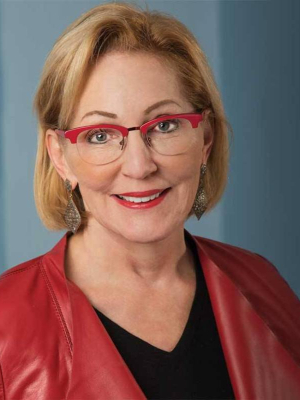
About the Podcast
Dr. Ruby K Payne is Clancy’s idol in the professional world, a globally renowned speaker, the leading expert on the subjects of economic class and education, and author of more than a dozen books and frameworks about poverty. Ruby shares amazing nuggets of her knowledge base so that we can all start understanding each other a better.
About Ruby K Payne
In her two decades as a consultant on education and economic class, Dr. Ruby Payne has published more than a dozen books and spoken extensively around the globe.
Ruby empowers educators and community leaders to address issues of poverty in classrooms, communities, businesses, hospitals, churches, and social services. Through aha! Process programs and conferences, Ruby has certified thousands of trainees in her Framework for Understanding Poverty and Bridges Out of Poverty models. Her book Emotional Poverty won an IPPY Award from the Independent Publishers organization, which named it one of the best educational resources of the year.
Over her distinguished career, Ruby has worked as a teacher and principal, written K–12 curriculum in all subject areas, and assisted in strategic planning and staff development programs for multiple organizations. Ruby’s work guides educators and community leaders through her extensive library of resources. She aims to equip everyone she meets with the tools to write a future story full of hope.
Uncover the hidden rules. Be empowered by empathy. Implement Ruby Payne’s proven practices. Write your future story with hope.
Discussion Takeaways
- Ruby’s work focuses on the lived experience of economic classes.
- Your environment shapes your thinking, and your thinking is heavily shaped by the age three. 96% of your brain is shaped by the age of six.
- Poverty is painful and a tool to deal with that pain is entertainment; that could be a food, technology, parties, and other things that bring pleasure.
- When moving from one economic class to the next, you think like the class you grew up in and a little bit like the new economic class you’re moving into.
- Some behaviors from living in poverty are hard to break. Hiding food is a common behavior for those in the foster care system.
- Whether it’s race, class, gender, age – inequities in all these areas boil down to opportunity gaps. Some gaps are caused by lived experiences, others by laws and policies, still others are caused by hunger, and some are because of poverty.
- Three things need to be brought back into high school: education on family relationships, personal finance and nutrition. Providing this knowledge base can allow people to deal with the major issues of our society.
- Teaching people how to cook is one of the fastest ways to teach math and reading.
- Mental models of economic class differ:
- In generational poverty, all decisions are about survival, relationships and entertainment to take away the pain of poverty. Food becomes a primary source of entertainment. Money and other resources are shared by the community.
- In poverty, who you know, what you know, what your resource base is, and what you need to survive are all incredibly important things for you to negotiate. If you’re hungry, most of your time is spent looking for food. A stable environment, isn’t a given. Quantity or how much you have is significant.
- In middle class, work, achievement, and ability to use your money wisely are priorities. You try not to ask for money. When money is borrowed, it’s always paid back. You never ask people about their salary. When you have enough, the issue is about the quality of what you have.
- As a wealthy person, personal safety becomes priority. Decision-making is about your immediate, safe connections. You never talk about the cost of an item. Presentation becomes of utmost importance.
- Mental models are best described in this analogy. Five people have five hotdogs. If you come from poverty, each person gets one hotdog. In middle class, people start asking how many hotdogs each person may want. They want to know how everyone wants their dog prepared. If you are wealthy, people ask if the hotdogs are bratwurst, turkey-based or beef based, who made the hot dog, and what the calories are.
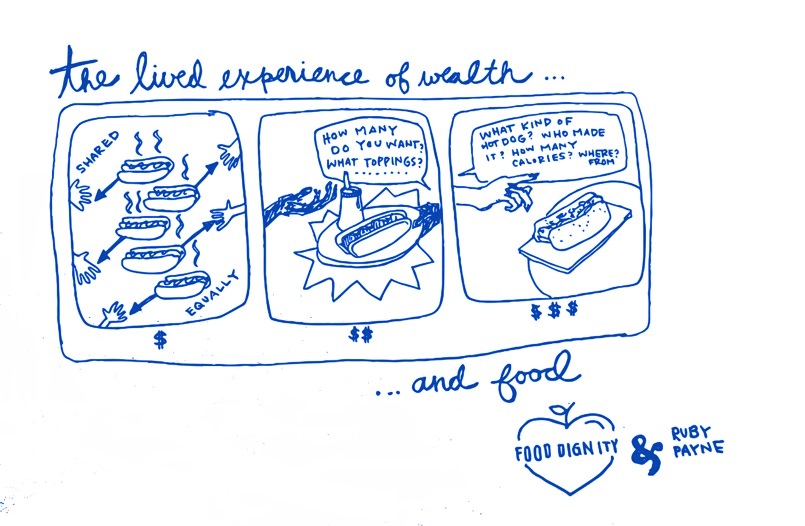
- Hunger is a thief. It steals everything from you. It takes your thoughts, moral code, your relationship, sleep, and so much more.
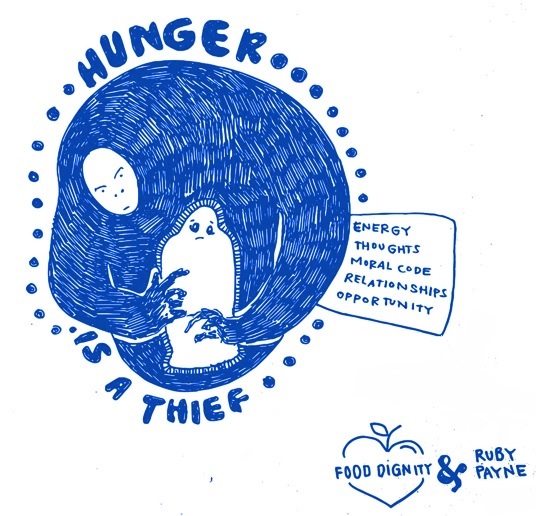
- Food, nutrition educators and healthcare providers can't assume anything. Recipes, resources, and nutrition education programming should always acknowledge clients' wants, needs, capabilities, and circumstances. Do people have access to nourishing food, cooking tools, or the ability to attain basic human needs like heat, electricity, or a roof over their head?
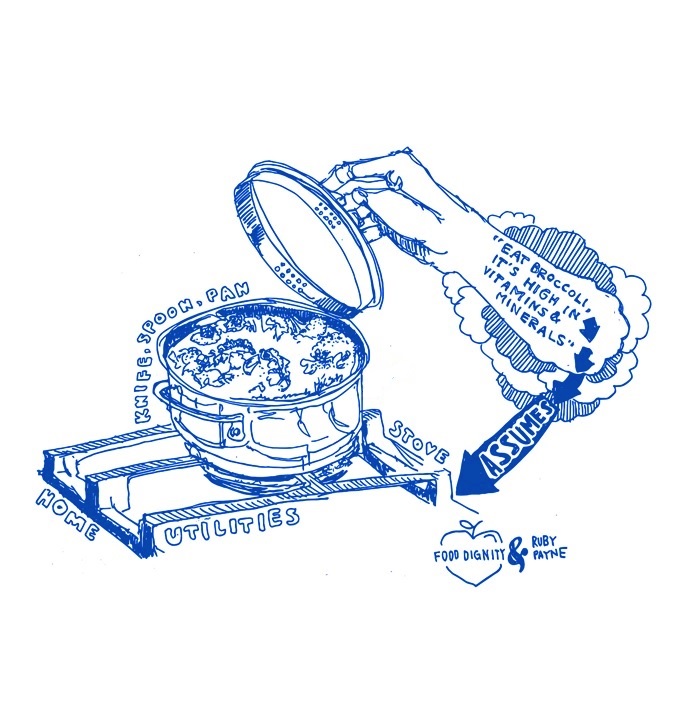
The beautiful images above were created by Rebecca Garofano, our Food Dignity Institute Lead and Illustration Specialist. You can find more of her work at @VeggieDoodleSoup on Instagram and at her website veggiedoodlesoup.com.
#1 tip to improve access to healthy food
We all need to consider what we can do as a community to begin to change the trajectory of the poor.
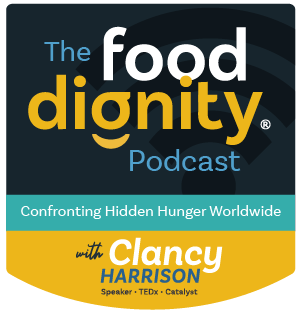
Each week on the Food Dignity® Podcast, the Food Dignity® Movement’s Clancy Harrison hosts a wide variety of hunger experts and other people making changes on the frontlines. Join us as we dive deep into conversations that will change the way you think about food insecurity.
Listen to our trailer!
Want to learn more about how we might work together?
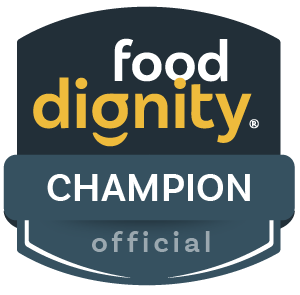
Fight hidden hunger by becoming a
Food Dignity® Champion and take the HIDDEN HUNGER PLEDGE >


